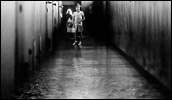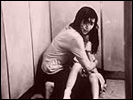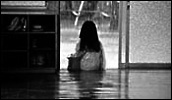Dark Water
- Year
- 2002
- Original title
- Honogurai Mizu no Soko kara
- Japanese title
- 仄暗い水の底から
- Director
- Cast
- Running time
- 101 minutes
- Published
- 4 December 2002



by Nicholas Rucka
My apartment building is a 100-year-old 6-storey walk-up in Manhattan. The building leaks, creaks, bangs, has questionable electrical wiring, and is not fire safe.
The first night I was in my apartment, I awakened in the middle of the night to a loud BANG. I chose to roll over and go back to sleep rather than stare down whatever or whoever had made the sound. The next morning, I discovered that a book I had left on my living room bookshelf had somehow been thrown to the floor - on the other side of the room. The book was Wang Shuo's "Don't Call Me Human"; I knew then that I had a ghost.
A year later I learned that the old lady who had lived in my apartment before the previous tenant had been found in an advanced state of decay on the kitchen floor. The sole survivors of the apartment were the deceased's cats, who were discovered circling their owner's body - perhaps gingerly feeding off it for the previous three weeks.
My apartment is alive and I know it has a lot of stories. But this makes sense seeing as it is an unrefurbished tenement. Hideo Nakata understands the concept of the old building that is alive and chose to set his film Dark Water in this type of location: an old, moldy, concrete apartment building. Nakata realizes that often times in horror, the location is an additional character in the cast - often co-starring.
Hideo Nakata first scared the loose socks off of a generation joshikosei's with 1998's Ring and followed this with a number of other horror films including the 1999 sequel Ring 2, and the same year's Chaos. As a result Nakata has been typecast as one of Japan's foremost horror directors. In the program for Dark Water he states, "If you were to ask me whether I love horror from the bottom of my heart, I would have to say no." But there's no denying that he excels at making creepy films, Dark Water included. However, whatever atmosphere he generates during the course of the film is squandered by a lazy, safe ending that reeks of producers meddling with an otherwise solid - if not hackneyed - story (based on the novel by Ring author Koji Suzuki).
Yoshimi Matsubara (Hitomi Kuroki) is in the middle of a terrible custody battle over 5-year-old Ikuko (Rio Kanno), with her abusive ex-husband. To compound the situation, Yoshimi has a history of mental instability sparked by residual abandonment anxiety connected to her mother's neglect when she was a child. Fearing that she will mentally damage Ikuko the way she had been and needing to show her independence to the family court, Yoshimi is dead-set on successfully living as a single mother raising her daughter.
Yoshimi and Ikuko move into an old apartment building on the outskirts of town. The building is a run-down concrete block, mysteriously short on (sane) tenants, but filled with little creepy touches like dripping ceilings, slow elevators, and banging sounds. Ikuko is the first to see the shadowy figure of a little girl wearing a yellow raincoat, but soon Yoshimi, who is already well on her way to a permanent mental vacation, starts seeing her in quick flits out of the corner of her vision.
Yoshimi starts to lose it when a pesky red bag that she repeatedly tries to get rid of keeps reappearing. All the while, her custody battle becomes more heated and for the family court Yoshimi's mental fitness is brought into question. When it seems that the situation could not get any worse, Ikuko falls into a coma after coming into contact with the mysterious girl in the yellow coat. Yoshimi is tortured and mentally fractured; everything seems to have taken a turn for the worse. Reflecting both Yoshimi's mental and the stories' thematic decline, the film becomes more and more saturated with water until it seems to reach a point of bursting...
Dark Water is a victim of its good points. The location and settings are so strong that they overpower the rest of the story. This coupled with weak story resolve and mediocre characterization discounts this film from being a worthy follow up to Ring to being a simply passable horror viewing experience; spiked with the occasional dynamic moment. The weakest point in the film is the end of the film when Yoshimi's actions just seem to be inconsistent with her character motivation that had been established earlier. So inconsistent that I can only attribute it to bad writing that was reasoned via some pseudo-Freudian psychoanalysis; primarily, Yoshimi's fear of abandonment and not being a good mother. Not to spoil the ending, but I did not believe Yoshimi's major decision at the end of the film and therefore did not find the last 15 minutes convincing.
Further proving my point, as if illustrating the inconsistency and confusion of the film's conclusion, the story enters into Ikuko's (alternate) present/future. This, ostensibly, is to show how Ikuko (now 16) is coming to terms with her life and ultimately the positive effect of Yoshimi's sacrifices for Ikuko. This sequence, outside of being saccharine and overwrought, is problematic because it doesn't exist within any sort of logical narrative space and time. I found myself so preoccupied for the last 15 minutes, trying to figure out when it was suppose to be taking place that I no longer was in the film world. When was the story supposed to have been set? The only conclusion I could make was meta-textual: the producers took the original story and changed it so that it would have some sort of safe / happy resolve that the audience could walk away from and not feel totally depressed. Narrative consistencies of time and space didn't matter.
Notwithstanding this, Dark Water is worth watching for a good chill. To fully enjoy it, my recommendation is, like all horror films it is best viewed in a dark room with all the lights off. This will help reveal two very solid aspects of this film: 1) great atmosphere, and 2) one really great scare. While watching it, if you hear the sound of something in the next room - and there shouldn't be any sound coming from there - ignore it until it is daylight outside...